Looking for holiday horror that digs deeper? The criminally underrated “ATM” cashes in as a priceless example of socially-charged terror.

Everyone understands that an effective thriller brings with it some high stakes. Make a single wrong move, and you’ll pay a high price for your miscalculation. But as another year winds to a close and we reflect upon our respective ledgers, director David Brooks’ 2012 movie ATM may possess the returns you’ve been looking for when it comes to well-paced suspense with something socially relevant to say.
It’s Christmas Eve, and David (Brian Geraghty) is a bit discouraged with his stockbroker job, which makes him intimately aware of the financial ups and downs of the clientele for which he works – especially during the holidays. Meanwhile, Emily (Alice Eve) has caught David’s eye at the office and could be a healthy distraction from his yuletide woes when he offers to drive her home from an office Christmas party.
Philosophically, they share some of the same ideologies that make working in finance a Faustian bargain of ethics and commerce. But when laid-back Corey (Josh Peck) invites himself along for the ride, that harmless hiccup becomes only the first of the evening.
As the trio stops at an ATM booth for pizza money and finds themselves stalked by an anonymous hooded figure (who apparently can’t access the ATM booth without a card of his own but still represents a considerable threat to the three inside), these young people will truly come to understand the high cost of living.
The three stars do a capable enough job with the film’s screenplay they’ve been given (economically paced and penned by Chris Sparling).
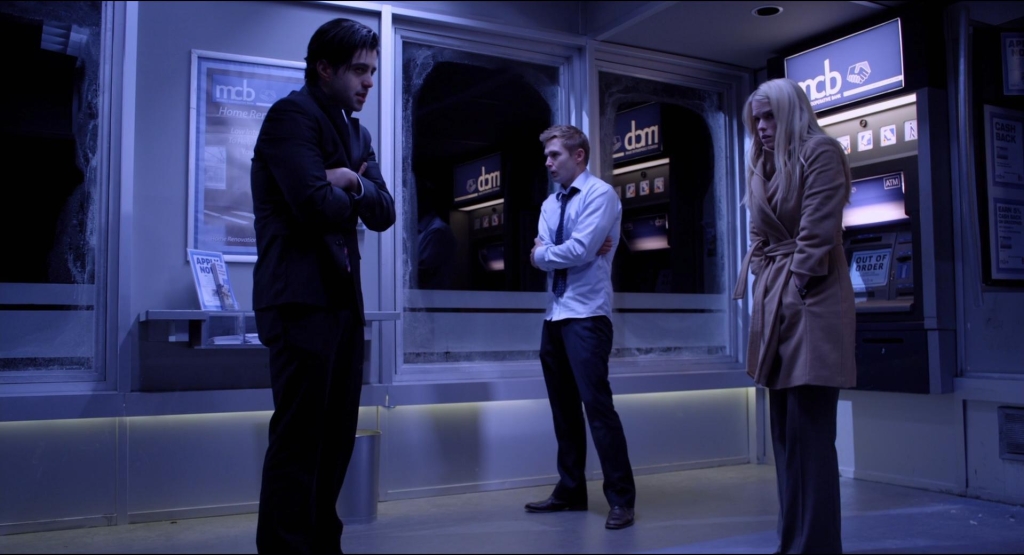
Their roles are one-dimensional throughout, which isn’t necessarily a criticism – the audience is given enough information to make them relatively sympathetic without distracting the viewer from the production’s action.
We understand that David is getting frustrated with his job of taking money from people who may need it more than him. Corey shrugs off the existential dilemma as a natural part of his day-to-day career. And Emily has taken on new employment across town that will likely take her away from the world of finance for which she no longer seems to have the stomach.
These three aren’t meant to be fully realized and humanized characters, serving as an interesting counterpoint to the inhuman assailant who will terrorize them in the film’s second and third acts.
These glimpses into their personalities could have helped to flesh out the film’s thesis, but it also would have detracted from the meticulously choreographed claustrophobia of the ATM booth.
Because it’s in the booth that ATM proves itself smarter than the film’s premise may at first suggest.
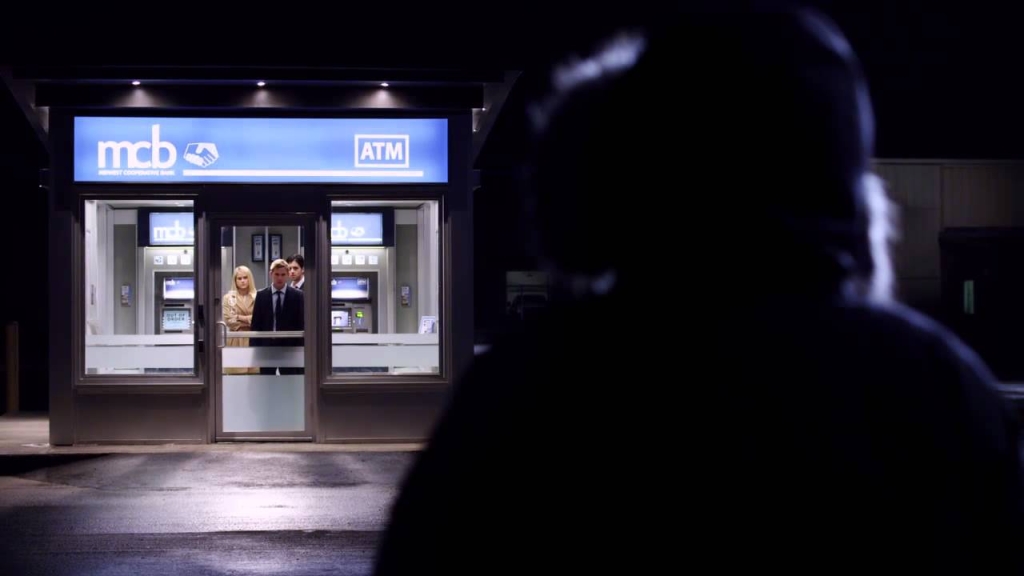
On its surface, ATM is a rather uncomplicated thriller. Its effortless approach to terror may be precisely what led to the film’s poor reviews.
But upon a closer look, it could be that the film’s underestimated nature is precisely what makes it a deft commentary about the nation.
Released in 2012, ATM‘s filmmakers were no doubt fueled by the financial recession that would affect so many Americans. By the end of 2012, the nation’s debt was 100% higher than it had ever been since WWII. And whatever the complicated insinuations of a national recession, one thing is certain: the stockholders are always better off than the wage earners.
Enter into this discussion – or the literal ATM booth – the film’s three would-be heroes, and the production starts to take on a much more nuanced appearance.
These three won’t be affected by financial woes. In fact, two of them – Corey and Emily – avoid being affected altogether by ignoring the effects of financial burdens or running from that knowledge by seeking employment elsewhere, respectively.
Their greatest threat, then, becomes the rather formless, ultimately faceless assailant denied access to the ATM booth. On a literal level, the perpetrator is kept out for not having an ATM card. But symbolically, the figure represents those who are denied access to wealth or financial sustainability by the privileged class who has seemingly had convenient access to it at all times.
The movie, then, becomes a conflict between the haves and the have-nots.
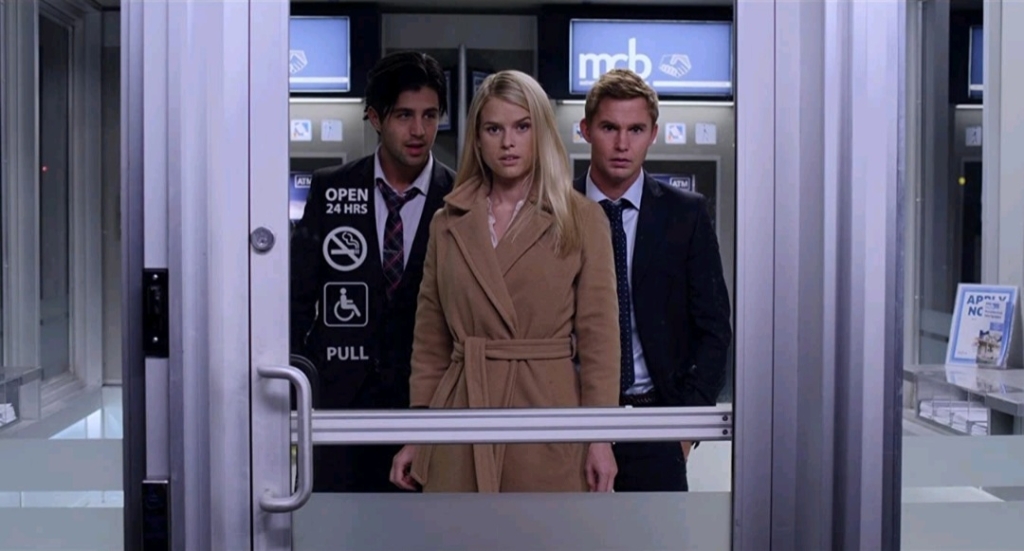
Once more, were the three protagonists more three-dimensional in their development, perhaps the film would have resonated more with audiences. But it’s difficult not to see the small army of similarly hooded strangers at the end of the film representative of the fact that the motion picture’s thesis isn’t reserved for these 90 minutes alone, which are tightly wound with jarring revelations that lead to the film’s shocking conclusion.
Or perhaps ATM simply came at the worst possible time for some viewers. So many moviegoers are seeking escape through cinema, not a reminder of their predicament.
This context and timing don’t make ATM an ineffective film. On the contrary, it’s a purposefully constructed picture that transcends what could look to most like elementary filmmaking.
If the picture is messy anywhere, it’s in the subject matter because it’s a bitter pill to swallow for the viewer.
The film doesn’t appear to care if you’re a have or a have-not. ATM simply demands your attention and asks that you keep track of all your receipts.
The traditional filmgoer isn’t looking for symbolism, for complication – especially from a genre generally characterized by its accessibility – but that’s what’s always made genre filmmaking like this so transgressive. It can speak to very real social concerns against a backdrop of taut suspense and terrifying jump scares.
But for those looking for an unsettling movie with purpose that may sometimes be as thoughtfully challenging as its own moments of terror, seeing ATM is a compelling transaction indeed.


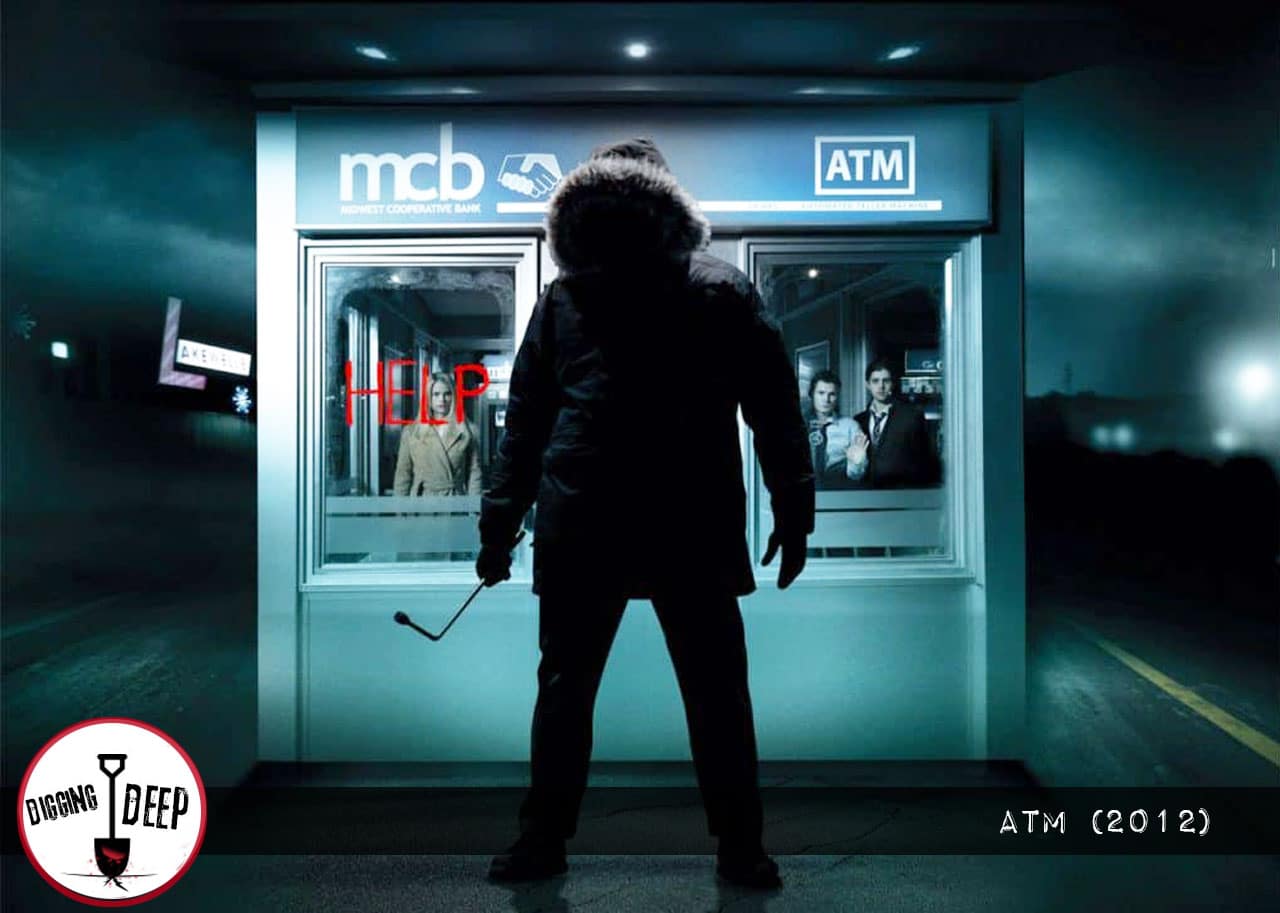






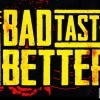



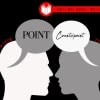
Follow Us!